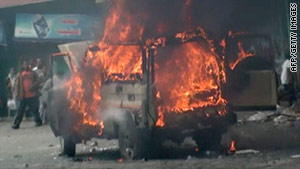Official: Pro-government tribesmen killed in Yemen airstrikes

- NEW: Tribal fighters accuse Saleh's regime of being two-faced
- The official says the government airstrikes missed their target
- Military officials blames limited coordination between tribes and government forces
- Yemen's relationship with its tribal leaders is further strained
(CNN) -- Recent Yemeni airstrikes targeting Islamic militants in the south accidentally killed at least 11 pro-government tribesmen, a senior Yemeni military official told CNN Sunday.
The attack took place just east of Zinjibar, the provincial capital of Yemen's restive Abyan province and a city that has seen clashes between government forces and al Qaeda-affiliated fighters intensify since Islamic militants first seized the town in May.
"We give our condolences to the brave tribal fighters who were killed in the Abyan air attack," said the official, who was not authorized to speak to the media.
The officials blamed the incident on poor communication: "Coordination between the tribes and the government forces is limited, and that is why the raid missed its target."
Still, the botched attack threatens to further weaken an already-strained relationship between Yemen's government and the country's powerful tribal structure. Indeed, a field leader for the tribal fighters in Abyan said the tribes informed the government of their whereabouts prior to the airstrikes to ensure that the tribes were not accidentally hit.
"Though the government was informed of where we where, tribes were attacked by not one air raid, but two air attacks," said Mohammed al-Gadani.
"The current regime and al-Qaeda are a coin with two faces. Both are working together against the stability of Yemen," said al-Gadani.
Yemen has been beset for months by anti-government ferment and militant activity. Ali Abdullah Saleh is recovering at a Saudi Arabian hospital from wounds he received in an attack last month.
The United States has been aiding Yemen's military in its fight against Islamic militants amid fears that al Qaeda is exploiting the political chaos and leadership vacuum engulfing the unstable and impoverished Arabian Peninsula country. However, Saleh's opponents have accused him of exploiting those fears in order to maintain U.S. support and stay in power.
On Saturday, hundreds of influential Yemeni tribal leaders met in the capital, Sanaa, and vowed to unite against Saleh.
Calling their assembly the "Alliance of Yemeni Tribes," attendees chose Sheikh Sadiq al-Ahmar as their leader. Al-Ahmar, the current sheikh of the powerful Hashid tribe, called on Saleh to step down after the shooting of dozens of protesters in March.
His tribe has opposed government forces and fought back against them in May and early June.
Al-Ahmar delivered a speech in which he promised, "President Saleh will not rule Yemen after today as long as I live."
At the end of their meeting, the tribes issued a statement calling for a civil nation and a country where everyone is treated equally.
